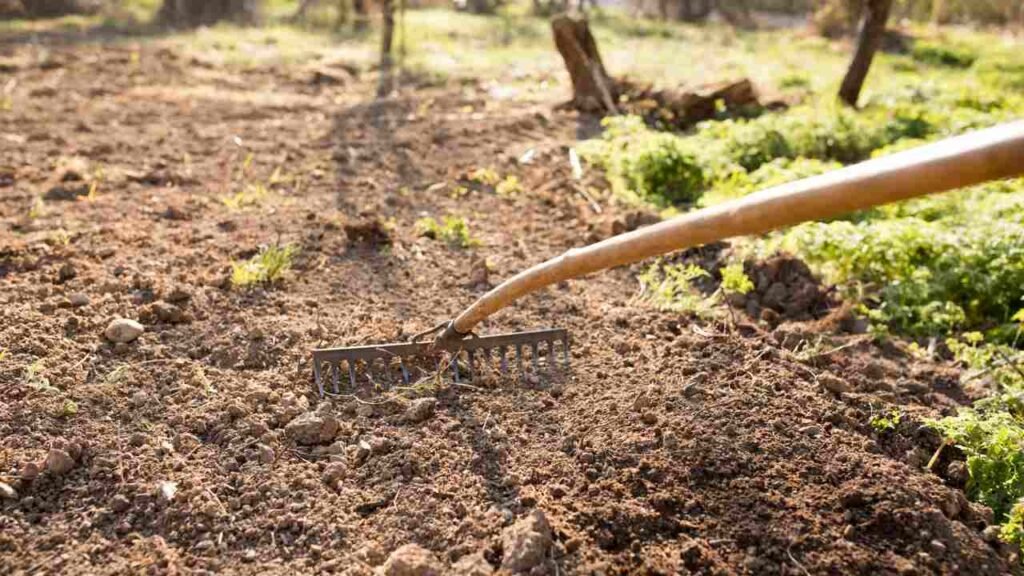
Begin your journey to clean the soil in your garden! It’s essential to understand the basics. Maintaining soil health is key for plants to thrive. Let’s discover the secrets of soil cleaning and rejuvenate your garden.
- Start by getting rid of debris: rocks, leaves, and dead plants. These can stop proper root growth and nutrient absorption. By removing them you’re ready for your plants.
- Check the pH level of your soil. This ensures the acidity or alkalinity is just right for your plants. You can adjust the pH with organic matter or special commercial products.
- Test the soil to see if it needs any more nutrients. This allows targeted supplementation, giving your plants all they need for healthy growth. Use organic or synthetic fertilizers depending on the results.
- Crop rotation is great for keeping soil healthy. Change the plant families each year. This stops nutrient depletion and avoids monoculture problems. This helps your garden soil stay healthy.
- Cover cropping is also beneficial. Protects bare soil from erosion and improves its structure. Cover crops work like living mulch, decreasing weed problems and offering a home for earthworms.
Adopting these ideas makes your garden soil cleaner. Know the importance of pH balance and nutrient supplementation. Crop rotation and cover cropping help maintain fertility in your garden.
Why is it important to clean garden soil?
Garden soil is important for plant health and productivity. Thus, it’s essential to clean it for optimal growth. Cleaning helps get rid of toxins, pests, diseases, and weeds that can hamper plant growth.
Also, it prevents pollutants, such as heavy metals and chemical residues, from accumulating. These can seep into plants and compromise their quality. Purifying the soil creates a safe and healthy environment for plants.
Plus, cleaning soil assists with drainage and aeration. Over time, soil can become compacted, blocking water flow and root growth. Removing debris and loosening the soil increases water infiltration, so roots get the required moisture.
When discussing the need to clean garden soil, its historical importance must be considered. Throughout history, people have relied on agriculture for sustenance. Early farmers knew clean soil was necessary for successful crop cultivation. They used techniques like crop rotation and composting to clean and enrich soils.
Tools and materials needed for cleaning garden soil
Sometimes, our gardens need a refresh! To get ’em squeaky clean and ready for new plantings, we’ll need some essential tools. Let’s get to it. We’ll need:
- A shovel – to dig and remove debris.
- A garden fork – to loosen the soil and break up clumps.
- A rake – to level the surface and remove small rocks and twigs.
- A sieve or screen – to filter out stones, roots and debris.
- Buckets or containers – to carry the sifted soil to the garden.
Plus, landscape fabric or weed barrier cloth – for protection against pests, weeds and diseases. It lets water and nutrients pass through to the plants.
Organic matter is also essential to enrich the soil’s fertility. Compost or well-rotted manure improves soil structure and adds nutrients. Compost also helps retain moisture in sandy soils and improves drainage in clay soils.
The Romans were known for their sophisticated agricultural practices. They’d plow their fields with wooden plows before planting crops. This helped aerate the soil and expel weeds.
Well, there you have it! Now we’ve got the tools and knowledge to embark on a quest for a healthier and happier garden.
Step-by-step guide on how to clean garden soil
Cleaning garden soil is essential for any avid gardener. Follow this guide to make sure your soil is free of impurities and ready to nurture plants.
- Remove weeds. Start by getting rid of any unwanted plants from the soil. This will create a good foundation for the garden.
- Till the soil. Use a garden tiller or hand cultivator to loosen up the soil. This will improve its texture and drainage.
- Remove debris. Take away stones, sticks, or leaves that may be on the soil’s surface.
- Test pH level. Use a testing kit to check if the soil is acidic or alkaline. Adjust with organic amendments like compost or agricultural lime.
- Apply mulch. Spread a layer of organic mulch over the garden bed to stop weed growth, keep moisture, and prevent soil erosion.
- Rotate crops. Plant different types of crops each season to stop nutrient depletion and disease buildup in the soil.
Also, remember to water your plants, give them enough sunlight, and watch out for pests or diseases.
My neighbor once had problems with her garden soil. But with dedication she managed to succeed! She started composting and added homemade organic fertilizer to her garden beds. Eventually, her plants grew healthy in nutrient-rich soil. It shows that anyone can clean and restore their garden soil!
Tips and precautions for cleaning garden soil
Gardening calls for keeping soil quality top-notch for optimal plant growth. Here are a few expert tips to clean garden soil:
- Compost: A great way to clean the soil is to add organic matter like compost. It helps in breaking down pollutants and improving soil structure.
- Mulch: Put a layer of mulch on the soil to stop weed growth and keep moisture levels steady. It also acts as a shield against airborne contaminants.
- Crop rotation: Change crops each season to avoid buildup of pests and diseases. This keeps soil healthy and clear of hazardous pathogens.
- Test the soil: Check the pH and nutrient levels consistently to sustain a balanced environment for plants. This lets you spot any deficiencies or excesses.
- Natural pesticides: Instead of chemical pesticides, go for natural options such as neem oil or insecticidal soap. These methods control pests without harming beneficial organisms in the soil.
Remember to always take out debris or dead plants from the garden. This stops disease spread and increases overall cleanliness.
Pro Tip: Crop rotation not only cleanses garden soil but also boosts plant health and yield.
Conclusion
Wrapping up our look at cleaning garden soil, it’s clear that having a healthy soil environment is key for a successful garden. To achieve this, gardeners should use the right techniques. Things like regular testing, adding organic matter, and crop rotation are great for having nutrient-rich soil and thriving plants.
It’s important to know that there’s more to cleaning garden soil than just removing debris. Testing helps figure out if there are any nutrient deficiencies or imbalances. Adding organic matter not only improves soil structure, but also restores nutrients. Crop rotation stops pests and diseases from taking over.
Looking back, ancient civilizations knew the value of soil fertility. The Mayans used slash-and-burn and composting for their farms. The Egyptians took advantage of the Nile River’s yearly flooding to bring nutrients to their fields. This shows us that long ago, people knew how important it was to have a sustainable soil management plan.
Frequently Asked Questions
1. How often should I clean my garden soil?
It is recommended to clean your garden soil at least once a year. However, if you notice any signs of pest infestation, diseases, or poor plant growth, it’s best to clean the soil immediately.
2. What are the steps to clean garden soil?
To clean garden soil, follow these steps:
– Remove any weeds, plant debris, or grass from the soil surface.
– Use a fork or shovel to loosen the top layer of soil.
– Rake the soil to remove rocks, stones, and roots.
– Use a sieve or mesh screen to sift out any remaining debris.
– Treat the soil with organic matter or compost to improve its fertility.
3. Can I reuse cleaned garden soil?
Yes, you can reuse cleaned garden soil. However, it’s essential to mix it with fresh soil or compost to replenish nutrients and improve its overall quality.
4. How do I sterilize garden soil?
To sterilize garden soil, you can use two methods:
– Solarization: Cover moist soil with clear plastic, ensuring it is tightly sealed. Leave it for 4-6 weeks under direct sunlight, which will kill pests and weed seeds.
– Baking: Place moist soil in an oven-safe container and bake it at 180-200°F (82-93°C) for 30 minutes to an hour. This method effectively kills pathogens and pests.
5. Are there any natural methods to clean garden soil?
Absolutely! Some natural methods to clean garden soil include:
– Crop rotation: Planting different crops each season helps break pest and disease cycles, reducing their populations.
– Composting: Adding organic matter to the soil improves its structure, fertility, and beneficial microbial activity.
– Mulching: Applying a layer of organic mulch helps suppress weeds and retains moisture, preventing soil contamination.
6. Can I clean garden soil without using chemicals?
Yes, you can clean garden soil without using chemicals by following organic practices. For example, incorporating compost, using crop rotation, and practicing proper hygiene in the garden can effectively maintain clean soil without resorting to chemical treatments.
